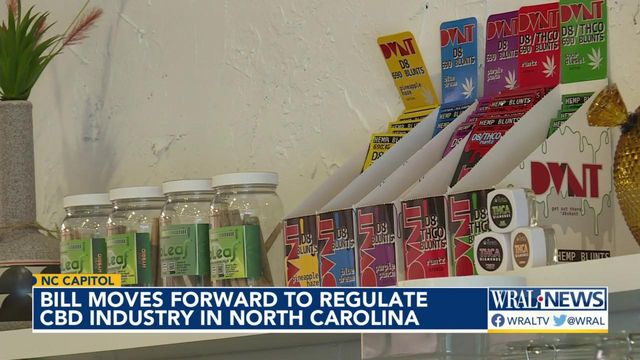NC lawmakers want to regulate what's in CBD products, how they are marketed
Lawmakers say it's time to regulate the cannabinoid industry in North Carolina.
Posted — UpdatedHouse Bill 563 passed through the House Judiciary committee Wednesday with an amendment. The bill says CBD products cannot be sold in servings more than 200 milligrams and testing is required after manufacturing. It also lays out several proposed changes, including licensing and marketing/packaging guidance.
“It’s kind of helping to do quality control in a backwards method,” Rep. Jeffery McNeely (R-Iredell) said during the committee meeting.
He said he tried making changes through the Department of Agriculture, but says the department said it did not have enough resources to do so.
“This is the best I could come up with with the government agencies that would work with us on this,” McNeely said.
Lawmakers say the new push comes in the an effort to keep CBD out of the hands of children, add consistency to the market and make it easier for consumers to understand what they are buying.
Matt Mitchell, owner of a shop in Pineville, agrees it is necessary. He says some packages don’t make it clear just how much CBD is in each gummy, or whether they contain THC, the substance in marijuana the brings the high.
“Even though a lot of people are against being told what to do and how to do it, this will really help the consumers to understand that what they’re buying is safe and keep them out of the hands of underage children,” he said.
• Be current in filing and paying taxes
There would also be a fee associated with licensing. Manufacturers would be required to pay $5,000, distributors would be required to pay $2,500, and both in-person and online retailers would be required to pay $100 per location (up to $2,500).
Licenses would need to be renewed annually.
Packaging of CBD products would need to be child-proof and include the proper warning label. There are also a host of other label requirements, including the list of ingredients, a statement that acknowledges the product is not FDA-approved, the total amount of ‘hemp-derived cannabinoid’ in milligrams and a code that can be scanned for more information.
Additionally, manufacturers and distributors would not be able to appeal to children.
Manufacturers and distributors “shall not advertise, market, or offer for sale the product by using, in the labeling or design … for the product imagery … that depicts or signifies characters or symbols known to appeal primarily to persons under 18 years of age, including, but not limited to, superheroes, comic book characters, video game characters, television show characters, movie characters, mythical creatures, and unicorns,” the bill reads.
CBD products themselves also cannot be in the shape of an animal or cartoon character.
Redhead Hemp owner Emma Macadam said she also believes the industry should have more regulation but worries about how it could affect her business.
“There’s a lot of low-quality products that are being sold at gas stations and certain shops. That responsibility falls on the store owners when they take in products,” she said. “I just hope that everyone gets a shot. I’m a small store; I’m owner operated. I don’t have some of the resources that other stores have that have many locations.”
The bill also has provisions to prohibit CBD use on school campuses.
Additionally, lawmakers are targeting kratom, which “commonly refers to an herbal substance that can produce opioid- and stimulant-like effects,” according to the National Institute on Drug Abuse.
The FDA recently sent out an alert, warning consumers not to use kratom.
The bill also has an 18-year-old age requirement and licensing process for kratom.
The Alcohol Law Enforcement Division is the agency in charge of enforcement. The bill also includes $2 million to hire 20 special agents to help with enforcement.
• Credits
Copyright 2024 by Capitol Broadcasting Company. All rights reserved. This material may not be published, broadcast, rewritten or redistributed.






